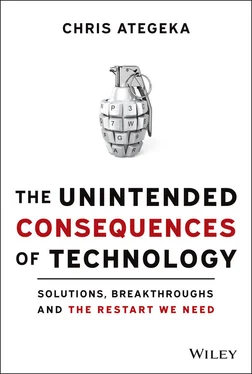Clearly, there are plenty of advantages to having these huge tech companies around, and there are many books out there dedicated to the subject. However, this book focuses mostly on the other side of the argument and looks at aspects of these companies that are not serving humanity's best interests. Let's dive into those issues next.
THE UNINTENDED OR WILLFULLY IGNORED NEGATIVE CONSEQUENCES OF A TECH-STATE
It is evident that tech-states have had a remarkable impact on many citizens of nation-states, by giving us access to a treasure trove of things we desire with a couple of taps or clicks. However, for all the good these companies have done, their dominating nature provides an opportunity to completely control innumerable aspects of our lives with no consequences for negative actions that arise as a result of their creations. In the following sections, we look at the unintended consequences of the outsized power of a tech-state.
Proportionality of the Userbase versus Country's Population Size
As noted in the Facebook and Google examples, the sheer size of users on these platforms outnumbers the population of individual states in which they operate.
China has the world's largest population (1.42 billion), followed by India (1.35 billion). The next five most populous nations—the United States, Indonesia, Brazil, Pakistan, and Nigeria—together have fewer people than India.
In a hypothetical example, let's say a nation-state accuses a tech-state of egregious misbehaving. That single country can decide to ban all its citizens from using a certain platform or block it entirely from its airwaves. Yet these technologies will continue to operate just fine and still be profitable. This has been witnessed in countries as tiny as Uganda, which ordered all social media to be blocked in its country (Reuters, 2021), and as big as Australia, when the government introduced a law to make tech-states pay media outlets for their news content and the firms fiercely fought back (de Vynck, 2021).
That's the outsized power of exponential technology and capitalism, which we examined in Chapter 1.
Tech changed a small but mighty social norm and the language around how it references customers and clients. They rebranded humans as users. There is an old adage that points out that the two industries that call their customers “users” happen to be illegal drug dealers and tech companies. This dehumanizing language creates the ability to enjoy “user numbers” and dollars coming into the business without taking much responsibility for the human element behind the users. This is an important starting point, and we will see how it plays out in many ways throughout the book. The nation-state is supposed to care about the humanity of its population, whereas the tech-state can comfortably work with users, which creates an emotional detachment. After all, they are just numbers.
It's important to mention that none of the tech-state companies may be doing this out of malice. It started as a benign tweak, but that dehumanizing language has now morphed into a larger problem. Tech-states can get away with this dehumanizing approach to business, and the abuse of the planet in general, because of their enormous power and influence over most nation-states. After all, providing meaningful oversight is increasingly difficult because power has shifted.
Opaque Employee Mistreatment
At the risk of offending some of my readers, I would like to draw some parallels between the tech-state and a pimp. A pimp is a person who controls sex workers and arranges clients for them, taking part of their earnings in return. A pimp knows his workers well, but does not always treat them well. A pimp knows how many tricks each worker can turn each night.
A pimp knows how long each worker can work before they are burnt out, essentially treating people like cars, like objects. After all, there will be plenty of other workers in line for the job. Replace the word “pimp” with “tech-state” and “sex worker” with “employee,” and you'll perhaps agree that the analogy holds strong.
They may not say so explicitly, but most tech-state companies (although not all of them) treat their workers like throw-away commodities. At companies like Amazon, some workers stay on the clock continuously to the point that they have no bathroom breaks. The company recently admitted that workers sometimes “urinate in water bottles” (Pocan, 2021) while they are out and about delivering packages. The workers are numb to the mistreatment because they are grateful to have a job, which, as an Amazon warehouse worker noted, is essential in order to put food on the table (Matsakis, 2020).
Tech-state companies often use the loophole of utilizing “contractors” to avoid paying people full benefits. In 2018, Google's contract workers outnumbered direct employees for the first time in the company's 20-year history. In San Mateo and Santa Clara counties alone, where most tech-states have headquarters, there are an estimated 39,000 workers who are contracted to tech companies, according to one estimate by researchers at the University of California, Santa Cruz (Sheng, 2018).
Repetitive stress injuries are an epidemic but are rarely reported. These include carpal tunnel syndrome or pain in the wrists, thumbs, hands, or forearms. Sometimes it's the overexertion injuries, which happen because heavy lifting on the job can cause neck and lower back pain. In 2015, the Occupational Safety and Health Administration cited a New Jersey Amazon warehouse for exposing workers to risk factors that included stress from continuous bending and repetitious exertions and prolonged standing during long shifts (Schibell & Mennie LLC, 2021).
These people are viewed as expendable. After all, tech-state knows that when one person leaves, there are plenty of people knocking at the door looking to do that same job.
As another example of tech-state companies keeping their workers down, Amazon has vehemently opposed its workers unionizing. Amazon's relentless push to beat back a union drive among warehouse workers mirrors the company's past efforts to oppose unions in Seattle, New York, Canada, and the United Kingdom (Greene, 2021). A unified voice could give workers power, which the company likely sees as a threat. Some companies have even been rumored to have gone as far as blacklisting and firing people who engaged in unionizing behavior that is deemed unacceptable.
Borrowing a page from the scare tactics used in the construction industry, in 2009 the union “Unite in the UK” took a case to the High Court after names were found in a file compiled by the Consulting Association, which was raided. More than 3,000 people were on the blacklist, often for being a union member or for raising safety issues (BBC News, 2009). This intimidation in construction or tech thwarts any internal attempts at organizing the workers within the company.
Tech-state companies may not always treat their workers well, but they do take good care of their users and shareholders. “Users” are the customers who pay for the product. “Customer is king,” they say. They know that without the customer they have no company. That's why they care. Shareholders are the investors and other entities who own a stake in the company. They care about shareholders, because without them they have no investment to grow the company. If only they applied this same thinking to their employees and to our planet, the world would be a better place. Because a dead planet is not a good place to run a business.
Money and Power in Politics
Facebook, Google, Amazon, and other companies like them spend a lot of money on lobbying, political donations, and other forms of cozying up to political leaders, to the point that those tasked with keeping them in check are held hostage by the donations from the founders and the companies themselves.
Читать дальше












